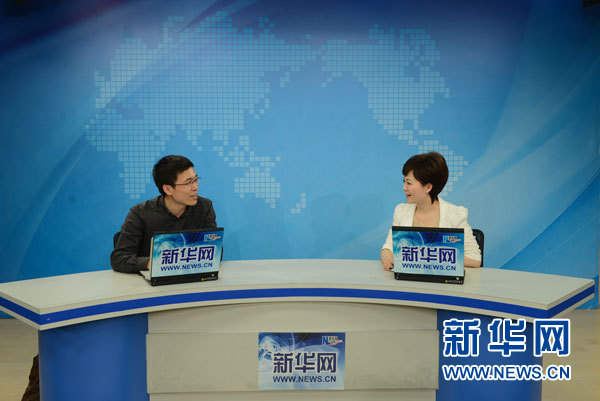Peking University, June 5, 2013: As the annual National College Entrance Exam comes, an admissions officer at Peking University (PKU/Beida) talked about the admission policy, internationalized training system, graduate employment, subsidizing policy, and open courses at the university.
The Xinhua interview with Wang Yazhang, deputy director of the Office for Undergraduate Admissions, was published on June 3.


Wang Yazhang at the interview
Enrollment policy
“These years’ enrollment number has been steady as Beida plans to take in a total of 3,430 students classified by majors in general,” said Wang. “We have been practicing the policy that students enrolled are classified by majors in general, not by specific subjects ever since 2003. For example, students can choose ‘Electronic Information’ which includes such subjects as Electronics, Microelectronics, Computer Science and Intelligence Science. Now we have 26 majors (not including foreign languages) in general, covering all subjects in humanities and sciences. We consider the policy as a favorable transit from elementary education to higher education.”
In response to such questions as whether there are some distinctive policies in the enrollment process or not, Wang said that students who can stand out in archaeology, philosophy summer camps or the like may get the admission qualification in advance. “In addition, students with sports specialty or the like or passing the independent recruitment exam can get some privilege, such as an extra of 5 or 10 points,” added Wang.
“As for students recommended for admission, we insist on high standards. Students can get the chance to be recommended for admission through two ways: win the first prize in the provincial or national or international contests on math, physics, chemistry or informatics; pass the comprehensive exam and the interview held by our university,” said Wang. “However, the second way will not be available next year, for the Ministry of Education has announced to change the policy in 2014.”
Internationalized training system
“As an internationalized university, Beida has already established cooperative relationship with over 200 universities scattered in 53 countries around the world,” said Wang when talking about the training policy.
“We try our best to improve the international level mainly by two methods: ‘going out’ and ‘inviting in.’ ‘Going out’ means that our students and teachers go out to study in foreign universities and research institutions and exchange with foreign students and scholars. Every year over 1,600 undergraduates, more than 60 percent of the total, get the change to go abroad by taking part in over 100 exchange programs provided by our university,” Deputy Director Wang detailed the internationalization strategy.
“‘Inviting in’ is another important policy carried out to broaden students’ horizons by international exchange. Beautiful campus, profound history and favorable conditions for research, all these factors attract over 700 foreign scholars and experts to give lectures and more than 9,000 overseas students to study at Beida,” added Wang. “We aim to turn the campus into a place with huge international culture where students can broaden their horizons even inside the country.”
Graduate employment
When asked about graduate employment, Wang said: “We have felt the toughness of this year’s job market, but we still remain optimistic.”
“Some 30 percent of the graduates choose to go abroad for further study, 40 percent continue their study inside the country, and others choose to enter the job market. With solid professional foundation, excellent comprehensive quality, sense of responsibility for the country, international horizon and pioneering and innovative spirit, Beida students can quickly adapt to their post and develop themselves into the leading figure of their field,” said Wang.
“A Global Employability Survey released by the International Herald Tribune in 2012 can prove the competitive advantage of Beida graduates. Beida ranked the first in Asia and 11th in the world in perspective of graduate’s competitiveness, according to the survey.”
Wang also said that graduates had changed their focus when hunting for jobs in recent years. For example, salary and welfare would come first for most students in those years when most areas of our country are underdeveloped. Now with the development of the country’s economy, graduates pay more attention to the follow-up development and career planning offered by the employers. “Nowadays many students choose to work in government agencies, research institutions and western areas. Though the salary may be low, they consider the work valuable and meaningful,” he summarized.
Subsidizing policy
“We have some preferential policies for students from rural areas. For example, the percentage of rural candidates should not be less than 20% in the independent recruitment exam. In addition, we have admission program exclusive to poverty-stricken rural areas. Last year, 30 rural students benefited from the program and this year the number increases to 60,” Wang explained the university’s preferential policies towards students from underdeveloped regions.
He also mentioned the subsidizing system for students from needy families set up in recent years. “We have Office of Student Financial Aid which provides grant and offers part-time jobs to students from needy families. About ten years ago, Beida makes the commitment that no Beida students drop out simply for economic reason. And we have fulfill the commitment,” said Wang.
Beida open courses
Wang also talked about “Online Open University” project which provides scores of online courses given by renowned teachers and continuing education aiming at people from all walks of life.
“In order to guarantee the favorable education environment, we have to control the enrollment number, thus many people lose the chance to attend China’s top institution of higher learning. However, they can still have access to the education resources at Beida by attending classes for most of Beida classes are open to the society.”
Extended Reading:
Qin Chunhua: What are Beida's admissions requirements?
Written by: Zhu Wenjia
Edited by: Jacques
Source: Xinhua